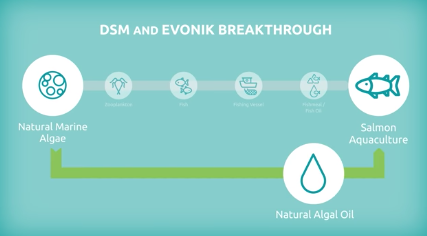Royal DSM has long been in the microalgae oil business after it acquired Martek Biosciences in 2010 for a whopping $1 billion (see my old article on this link). The company has been pretty quiet when it comes to announcements within this business but I guess this is about to change (watch out Terravia!).
DSM and Evonik just announced plan to establish a joint venture for omega-3 fatty acid products from natural marine algae for animal nutrition. The companies claim their omega-3 source is the first to offer both EPA and DHA and will be aimed at initial applications in salmon aquaculture and pet food. The companies will together build a commercial-scale production facility in the United States.
DSM Nutritional Products and Evonik Nutrition & Care will each hold a 50% share in the joint venture and co-own the production facility, which will be built at an existing site of Evonik and is expected to come on stream in 2019. The joint venture plans to invest around US$ 200 million in the facility ($100 million by each party over circa 2 years). The initial annual production capacity will meet roughly 15% of the total current annual demand for EPA and DHA by the salmon aquaculture industry. The set-up of the joint venture, to be named Veramaris and headquartered in The Netherlands, will be finalized subject to regulatory approvals and other customary closing conditions.
The JV claims it will enable the animal nutrition industry to keep up with the increasing demand for these two essential omega-3 fatty acids without endangering fish stocks, contributing to healthy animal nutrition as well as to the ecological balance and biodiversity of the oceans. The joint venture follows the joint development agreement, signed in July 2015 where DSM and Evonik have successfully produced pilot-scale quantities of the algal oil at DSM’s production facility in Kingstree, South Carolina (United States). Customers will be able to receive sizeable quantities of the product for market development while the construction of the new manufacturing plant is underway.
DSM’s expertise is in the cultivation of marine organisms including algae and long-established biotechnology capabilities in development and operations, whilst Evonik’s focus has been on developing industrial biotechnology processes and operating competitively large-scale manufacturing sites for fermentative amino acids.
Worldwide fish oil production is approximately one million metric tons per year. Most of the fish oil is used in aquaculture, mainly for fat-rich fish species, such as salmon. The limited wild fish stocks restrict the amount of fish oil available and thus the growth of the aquaculture industry. Currently, the industry uses about 75% of the annual production of fish oil. Evonik and DSM said their algal oil will offer a sustainable non-fish alternative.




